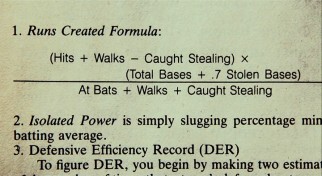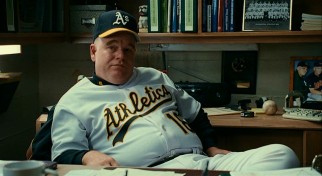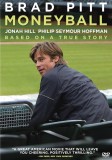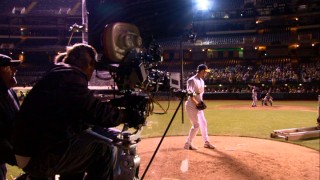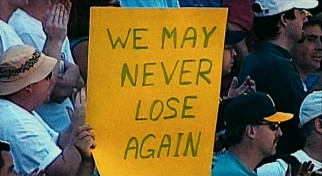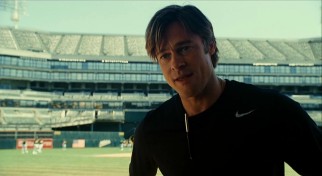Moneyball DVD Review
 |
Moneyball
Theatrical Release: September 23, 2011 / Running Time: 133 Minutes / Rating: PG-13 / Songs List Director: Bennett Miller / Writers: Steven Zaillian, Aaron Sorkin (screenplay); Stan Chervin (story); Michael Lewis (book) Cast: Brad Pitt (Billy Beane), Jonah Hill (Peter Brand), Philip Seymour Hoffman (Art Howe), Robin Wright (Sharon), Chris Pratt (Scott Hatteberg), Stephen Bishop (David Justice), Reed Diamond (Mark Shapiro), Brent Jennings (Ron Washington), Ken Medlock (Grady Fuson), Tammy Blanchard (Elizabeth Hatteberg), Jack McGee (John Poloni), Vyto Ruginis (Pittard), Nick Searcy (Matt Keough), Glenn Morshower (Ron Hopkins), Casey Bond (Chad Bradford), Nick Porrazzo (Jeremy Giambi), Kerris Dorsey (Casey Beane), Arliss Howard (John Henry), Reed Thompson (Young Billy Beane), Spike Jonze (Alan - uncredited) |
Buy Moneyball from Amazon.com: DVD • Blu-ray • Blu-ray + DVD Combo Pack • Instant Video
Though baseball has long been celebrated as America's pastime, movies about the game have never really soared at the box office. So, despite becoming the third highest-grossing baseball film on record (ignoring considerable ticket price inflation), Moneyball tells the true story of two men who sought to reinvent major league baseball by approaching it from financial and statistical points of view. In 2001, the Oakland Athletics post a 102-win season, the second best in the majors, but lose to the New York Yankees, an organization with three times as large a payroll, in the first round of the playoffs. Afterwards, the A's lose three of their best players to free agency, unable to match the lucrative contracts extended by far wealthier teams.
The rebuilding challenges are not ones that A's general manager Billy Beane (Brad Pitt) wishes to meet with conventional wisdom. While his seasoned, old scouts are citing intangible factors like potential players' off-field antics and girlfriends, young former player Beane's interests lay elsewhere: in the numbers.
Enamored with the somewhat marginalized statistics work of baseball historian Bill James, Beane wishes to rely on empirical evidence for making up the hits and runs that Johnny Damon, Jason Giambi, and Jason Isringhausen accounted for. On a whim, Beane hires Peter Brand (Jonah Hill), an economics major fresh out of Yale and low on the Cleveland Indians' totem pole, to be his assistant general manager. Passionate about number-crunching, young Brand has derived a formula for ascribing a single meaningful value to every player in the game. With that data, Beane and Brand find the most underpaid individuals in the league and pursue them to fill in the A's gaps.
The cold, analytical approach is dismissed by MLB veterans in and outside the A's clubhouse and seemingly rightfully so when the team starts off the 2002 season sluggishly enough for Beane's daughter (Kerris Dorsey) to worry about his job safety. Then the A's pull off one of the greatest turnarounds in the history of sports, capped by an electrifying winning streak that shattered a decades-old American League record, vindicating Beane's outside-the-box thinking.
It's an inspiring tale and one winningly told without too much fiction or any sap by accomplished screenwriters Steven Zaillian (Schindler's List, Awakenings, American Gangster) and reigning Oscar winner Aaron Sorkin (The Social Network, A Few Good Men, and creator of TV's "The West Wing"). The script is sharp and wise, largely keeping us away from play-by-play in favor of richer personality-driven human drama. In the follow-up to his award-winning debut Capote, Bennett Miller directs the film to maximum impact, never dumbing down or oversimplifying for mass consumption, but still avoiding the nitty-gritty enough to make this absorbing to as broad an audience as possible.
Consummate pro Pitt has his pick of the industry's litter and continues to choose more wisely than any other A-list star. He may be ten years too old to play Beane ten years ago (you don't notice) and the characterization is not a huge stretch for him (you won't care), but nonetheless the compelling lead performance greatly elevates the material. Only when you compare Pitt's understated yet earnest and wholehearted work to other sports movie anchors, from the bland (Kevin Costner and Dennis Quaid) to the corny (Sandra Bullock and Diane Lane) to the athletically challenged (Michael J. Fox) to the cinematically challenged (Anfernee Hardaway) do you realize how appealing a center it is.
Pitt's chemistry with Jonah Hill, making an unexpectedly appropriate departure from his easygoing comedy roles, makes them as enjoyable as any big screen pairing of 2011. Supporting actors seize their limited opportunities to make their own mark, including an overbilled Philip Seymour Hoffman as manager Art Howe, a blink and miss Robin Wright as Beane's ex-wife Sharon, and Chris Pratt as catcher-turned-first baseman Scott Hatteberg.
The first-rate writing, direction, and performances all help redirect our attention from the question that surrounds the story and the Michael Lewis book that inspired it. That question still lingers upon reflection, though. How much credit do Beane and his methodology deserve for the Athletics' unexpected success in 2002? The movie uses trades as a way to demonstrate a tough part of management and to justify the distance Beane keeps from his players, but what about the fact that one of those sent shipping is none other than Jeremy Giambi, one of the players the numbers showed would be vital to making up for his brother's departure? Does that not discredit the purely numerical theories of "moneyball"? If not, then what of the end result, which will come as a surprise only to those who pay no mind to major league baseball? Those potential plot holes are not especially troubling in this fine, sufficiently faithful film treatment which testifies to the talents of everyone involved.
Though not quite a blockbuster, Moneyball still performed quite well at the box office for an adult drama. Trailing only A League of Their Own and, narrowly, The Rookie in unadjusted baseball movie grosses, but several '80s and '90s pictures (from The Natural, Major League, and Bull Durham down to Rookie of the Year and Angels in the Outfield) in tickets sold, the film's nearly $75 million take still bested all but a few of this year's fall movie releases.
However, Moneyball did not quite recreate the acclaim and attention won by The Social Network, the fellow Scott Rudin-produced, PG-13 Columbia Pictures docudrama, whose 2010 release set a clear prestigious precedent to follow. Right now, I am expecting a field of six, which would make Moneyball the highest-regarded potential nominee to miss the cut. Still, expect the film to compete in at least the Best Actor and Best Adapted Screenplay categories. And stranger things could happen than Jonah Hill sneaking into the Supporting Actor field as well. But even if it picks up these three nominations or more, Moneyball will most likely come away from Oscar Night empty-handed.
Moneyball keeps sticking to The Social Network's playbook with an early January Blu-ray and DVD release. Sony makes the film available next week in a single-disc DVD, a single-disc Blu-ray, and a two-disc Blu-ray + DVD Combo Pack. We cover the first of those here. VIDEO and AUDIO
A DVD asking a 133-minute movie to share space with over an hour of additional video inevitably needs to use more compression than ideal, or so it would seem to someone who in a year has become quite used to the high definition video of Blu-ray Discs. Nonetheless, Moneyball doesn't look too bad in the DVD's 1.85:1 anamorphic widescreen transfer. Apart from slight artifacting, the print is clean and holds up in light and dark moments alike. Complementing the compelling visuals is a fine Dolby Digital 5.1 soundtrack. It comes to life on occasion with stadium noise and music, but also meets one's demands during quieter moments of sharp dialogue exchange.
BONUS FEATURES, MENUS and PACKAGING
The first of the DVD's four extras is a single blooper whose title, "Brad Loses It", gives some indication of what it is. "It" is not Pitt's cool, but his composure, as the actor fights back laughs (and tears) on his side of a scene with Jonah Hill for just over three minutes.
Next come three long deleted scenes (12:05), the first of which gives us more of Philip Seymour Hoffman, the second of which puts Billy on a date, and the final of which serves up a kind of alternate ending in what it reveals. None of them would drastically change the film, but they're nice to see here.
The featurette "Billy Beane: Re-Inventing the Game" (16:00) gives more consideration to Moneyball's human and theoretical subject, with comments from the filmmakers, author Michael Lewis, Alex Rodriguez, and Beane himself reflecting on the A's 2002 season and using stats to compensate for league disparities.
The other featurette, "Moneyball: Playing the Game" (19:26) pays more notice to the film, specifically its efforts to get the production design details and period authenticity right, with help from Major League Baseball and a mix of real and dressed-up locations. On Blu-ray, Moneyball gets a few additional extras, the featurettes "Drafting the Team" and "Adapting Moneyball" (which should cover the ground ignored here) and an exclusive preview for the forthcoming PlayStation game MLB 12: The Show. Amazon listings also indicate that both Blu-ray editions also include access to an UltraViolet digital copy stream, though that format has quickly earned its fair share of vocal detractors.
The DVD opens with a new hard sell Blu-ray promo and trailers for Jack and Jill, The Ides of March, and Courageous. A previews menu provides direct access to those three eclectic trailers along with ones for The Rum Diary and Anonymous. Moneyball's own trailer is sadly absent.
The main menu plays a moody, scored montage of slow motion and dramatic footage. Inside the standard black keepcase, a booklet promotes kindred films on Blu-ray, Michael Lewis' book, and the Sony Tablet, in addition to supplying you a unique code in Sony's Rewards program.
CLOSING THOUGHTS
An interesting story brought to the big screen with skill and care, Moneyball is one of 2011's most enjoyable dramas and among the least likely to divide audiences. Sony's DVD delivers an okay feature presentation and a decent 50-minute serving of bonus features. It's easy to recommend, but if you're planning to add the film to your collection, you may very well prefer to go with the Blu-ray or combo pack for just a few dollars more.
Support great cinema and this site when you buy Moneyball now from Amazon.com:
|
Related Reviews:
DVDizzy.com | DVD and Blu-ray Reviews | New and Upcoming DVD & Blu-ray Schedule | Upcoming Cover Art | Search This Site
Brad Pitt: The Curious Case of Benjamin Button • The Tree of Life • Ocean's Thirteen • Megamind
Jonah Hill: Superbad • Cyrus • Funny People | Philip Seymour Hoffman: Doubt • Jack Goes Boating
2011 Academy Awards Contenders: Midnight in Paris • The Help • Rango • Rise of the Planet of the Apes
Baseball: Mr. 3000 • Angels in the Outfield • The Rookie • Angels in the Infield • How Do You Know
True Sports: Invincible • Invictus • Remember the Titans • Cool Runnings • Secretariat • The Fighter
Moneyball Songs List (in order of use): "New York New York", This Will Destroy You - "The Mighty Rio Grande", "The Show", Journey - "Don't Stop Believin'", Billy Idol - "Mony Mony", Joe Satriani - "The Star-Spangled Banner", DJ Laz - "Bounce to Dis", Parliament - "Give Up the Funk (Tear the Roof Off the Sucker)", "It Would Be Like This"


